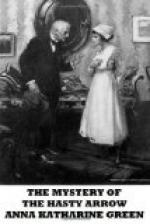“It was not she who was struck, but it was she who was aimed at. The young girl merely got in the way. But before I enlarge upon this point,” he continued in lower tones as the two officials slowly reseated themselves, “allow me to admit that any proof of correspondence between these old-time lovers would have added much to my present argument. But while I have no doubt that such an interchange of letters took place, and that in all probability some one or more of them still exist, Mrs. Taylor’s illness and Mr. Roberts’ high position prevent any substantiation of the same on our part. I must therefore ask you to assume that it was in obedience to some definite agreement between them that she came to the museum on that fatal morning and made her appearance in that especial section of the gallery marked II. If this strikes you as inconceivable and too presumptuous for belief, you must at least concede that we have ample proof of his entire readiness for her coming. The bow brought up so many days before from the cellar was within reach; the arrow under his coat; and his place of concealment so chosen as to make his escape feasible the moment that arrow flew from the bow. Had she entered that section alone—had the arrow found lodgment in her breast instead of in that of another—nay, I will go even further and say that had no cry followed his act, an expectation he had every right to count upon from the lightning-like character of the attack,—he would have reached the Curator’s office and been out of the building before quick discovery of the deed made his completion of this attempt impossible.”
“But the girl did cry out,” remarked the Assistant District Attorney. “How do you account for that, since, as you say, it was not natural for one pierced to the heart without warning?”
“Ah, you see the big mistake we made,—Correy and all the rest of us. Had Miss Willetts, or I should say, Mademoiselle Duclos, been the one to let out that dolorous cry, the man just behind the partition would have been there almost in time to see her fall. Correy, who started up the stairs at the first sound, would have been at the gallery entrance before the man of the arrow could have dropped the hanging over his retreating figure. But it was not from her lips, poor girl, that this gasping shriek went up, but from those of the woman who saw the deed and knew from whom the arrow came and for whom it was meant. How do I know this? Because of the time which elapsed, the few precious minutes which allowed Mr. Roberts to get as far away as the court. For she did not voice her agony immediately. Even she, with her own unwounded heart keeping up its functions, stood benumbed before this horror. Not till the full meaning of it all had penetrated her reluctant brain did she move or cry out. How long this interval was; whether three minutes were consumed by it, or five, we have no means of telling. She, in her despair, would take no note of time, nor would Mr. Travis, reeling in the opposite gallery under the shock of seeing all that he loved taken from him in one awful minute.”




